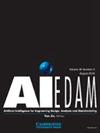Potentials and challenges of analyzing use phase data in product planning of manufacturing companies
IF 2.3
3区 工程技术
Q3 COMPUTER SCIENCE, ARTIFICIAL INTELLIGENCE
Ai Edam-Artificial Intelligence for Engineering Design Analysis and Manufacturing
Pub Date : 2022-03-01
DOI:10.1017/S0890060421000408
引用次数: 4
Abstract
Abstract The successful planning of future product generations requires reliable insights into the actual products’ problems and potentials for improvement. A valuable source for these insights is the product use phase. In practice, product planners are often forced to work with assumptions and speculations as insights from the use phase are insufficiently identified and documented. A new opportunity to address this problem arises from the ongoing digitalization that enables products to generate and collect data during their utilization. Analyzing these data could enable their manufacturers to generate and exploit insights concerning product performance and user behavior, revealing problems and potentials for improvement. However, research on analyzing use phase data in product planning of manufacturing companies is scarce. Therefore, we conducted an exploratory interview study with decision-makers of eight manufacturing companies. The result of this paper is a detailed description of the potentials and challenges that the interviewees associated with analyzing use phase data in product planning. The potentials explain the intended purpose and generic application examples. The challenges concern the products, the data, the customers, the implementation, and the employees. By gathering the potentials and challenges through expert interviews, our study structures the topic from the perspective of the potential users and shows the needs for future research.在制造企业产品规划中分析使用阶段数据的潜力和挑战
对未来产品世代的成功规划需要对实际产品的问题和改进潜力有可靠的见解。这些见解的一个有价值的来源是产品使用阶段。在实践中,产品计划人员经常被迫与假设和推测一起工作,因为来自使用阶段的见解没有得到充分的识别和记录。解决这一问题的新机会来自于正在进行的数字化,它使产品能够在使用过程中生成和收集数据。分析这些数据可以使制造商产生和利用有关产品性能和用户行为的见解,揭示问题和改进的潜力。然而,对制造企业产品规划中使用阶段数据分析的研究却很少。因此,我们对八家制造企业的决策者进行了探索性访谈研究。本文的结果是一个详细的潜力和挑战的描述,受访者与分析在产品规划的使用阶段数据相关。潜能解释了预期目的和通用应用示例。这些挑战涉及产品、数据、客户、实现和员工。我们的研究通过专家访谈收集潜力和挑战,从潜在用户的角度来构建主题,并显示未来研究的需求。
本文章由计算机程序翻译,如有差异,请以英文原文为准。
求助全文
约1分钟内获得全文
求助全文
来源期刊
CiteScore
4.40
自引率
14.30%
发文量
27
审稿时长
>12 weeks
期刊介绍:
The journal publishes original articles about significant AI theory and applications based on the most up-to-date research in all branches and phases of engineering. Suitable topics include: analysis and evaluation; selection; configuration and design; manufacturing and assembly; and concurrent engineering. Specifically, the journal is interested in the use of AI in planning, design, analysis, simulation, qualitative reasoning, spatial reasoning and graphics, manufacturing, assembly, process planning, scheduling, numerical analysis, optimization, distributed systems, multi-agent applications, cooperation, cognitive modeling, learning and creativity. AI EDAM is also interested in original, major applications of state-of-the-art knowledge-based techniques to important engineering problems.

 求助内容:
求助内容: 应助结果提醒方式:
应助结果提醒方式:


